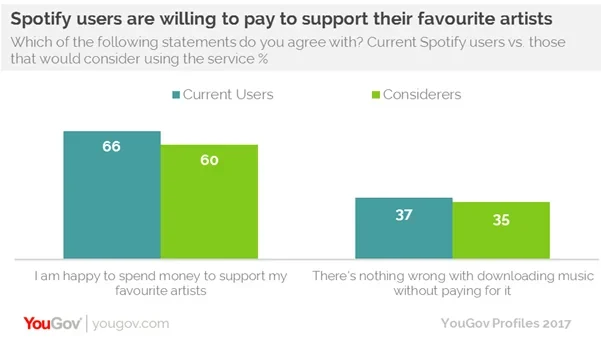Earlier this month Spotify announced that it had reached 50million paid subscribers, as it continues to battle against Apple Music.
However, last week brought a new twist in the streaming story.
It was reported that Spotify wants to restrict some music to paying subscribers only, meaning that users who currently listen for free may not be able to access the latest releases from big-name artists.
There has been a good deal of pressure on Spotify to negotiate licensing deals as artists look to improve their royalties from streaming services.
According to YouGov’s brand tracking data, the news hasn’t impacted the service too much, at least in the short term. Our figures show that while there has been a 4 point drop in Purchase Consideration (whether people would think about using the service) other metrics such as Impression and Reputation have remained healthy.
The key question for Spotify – and its rivals such as Tidal and Deezer – is how many of those that currently stream free of charge will look to sign up to the monthly fee. In the past, Spotify’s bosses have allowed free use anticipating that it will act as pre-curser to a full sign up at a later date.
YouGov Profiles data suggests there are reasons for both optimism and caution. Among Spotify’s current users (both free and paid for) two thirds (66%) say they are happy to spend money to support their favourite musicians and even among those that would think about using Spotify this figure is still six in ten (60%). This highlights one argument Spotify can deploy when communicating the change to its users.

Our data also indicates that many Spotify customers already use other paid-for entertainment streaming services, with over a third (36%) being Netflix subscribers, for example.
Persuading those most wedded to the idea of ‘free’ music to dip into their pockets and actually pay for it remains the toughest challenge facing the sector: over a third (37%) of current users saying they don’t believe there’s anything wrong with downloading music without paying for it.
This article originally appeared in City A.M.






